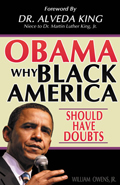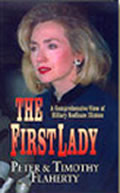NOT EVEN HOUDINI COULD ESCAPE THE TWO PARTY SYSTEM
By
Jon Christian Ryter
November 18, 2009
NewsWithViews.com
The first political party to fail in the United States was the party of George Washington—or, perhaps, we should say the Party of John Adams since he both created it and destroyed it. There were no official political parties during American's first presidential election. In fact, the first Presidential election is the only one which took place in an odd-numbered year. The election took place immediately following ratification of the Constitution. The polls opened on Dec. 15, 1788 and closed on Jan 10. 1789. The ballot count was completed on April 6, 1789. All of the candidates, you might say, were "Independents" since there were no formal parties. Vying for the role of first chief executive of the newest nation on Earth were eleven eager candidates and one man who didn't want the job. Those who became the most ardent Federalists were the wealthiest landowners.
The leader of the Federalist movement was Alexander Hamilton who likely would have been among the first 5 presidents had he not been killed in a duel by Aaron Burr. Hamilton built the party by enlisting support from powerful businessmen in the colonies who wanted strong fiscal policies and a central bank backed by the Rothschilds of Europe. To achieve the Hamilton goals, control of government had to be wrested from the States. That's why only the wealthiest men in the country, those with more national than State interests—could be counted on to support Hamilton and Adams—who saw backing Hamilton as the only way he would win the presidency.
The most eager presidential candidate in 1788-89 was John Adams of Massachusetts. Adams was a former minister to Great Britain when the United States was a colonial possession. In alphabetical order the announced candidates for the role as America's first President were James Armstrong, a Georgia politician; George Clinton, Governor of New York; Robert Harrison, a popular Judge from Maryland; John Hancock, a rum and molasses smuggler, warehouse owner, the man who orchestrated the Boston Tea Party and one of the two men most responsible for the Revolutionary War; Samuel Huntington, Governor of Connecticut; John Jay, Minister of Foreign Affairs in the colonies and the first Chief Justice of the Supreme Court; Benjamin Lincoln, Lt. Gov. of Massachusetts; John Milton, Secretary of State of Georgia; John Rutledge, a former governor of South Carolina; Edward Telfair, a former governor of Georgia; and Gen. George Washington who expected to return to Mt. Vernon and tend his farm and perhaps play poker again every Saturday night with his friends at a local tavern.
It took some old-fashioned Virginia arm-twisting to get Washington to come out of retirement and accept the role as the nation's first president. Once he agreed, the only opposition came from Adams who lobbied the electors who were already committed to Washington to switch their ballots and vote for him, not Washington. Alexander Hamilton, who became the nation's first Secretary of the Treasury organized an end run around Adams to guarantee that Adams could not secure enough votes to win against Washington. When the US Senate counted the ballots, Washington received 69 votes. Adams, who heartily campaigned for the job, received 34 votes. Washington was sworn in as the nation's first president on the balcony of New York's Federal Hall on April 30, 1789. He was 57 years old. He immediately entered the Senate chamber and delivered his inaugural address.
Unlike those who followed him, Washington placed all of his adversaries in important roles in his Administration and made them a key part in the structuring of the nation. He was not only the most popular president in the history of the United States, he was also the most productive president. He not only won the war for freedom, he structured that freedom into liberty and built the nation which dispensed it. Had John Adams somehow been elected our first President, America's experiment with a Republican form of government would have lasted less than a decade, with Adams assuming the trappings of a king and Congress looking more like the British House of Commons and House of Lords than the Congress of the United States.
Even though Washington overwhelmed Adams, taking 71.76% of the popular vote, most progressive academician historians believe that Abraham Lincoln and not Washington is the most popular president today, even though Lincoln won the Election of 1860 with 39.8% of the vote—and his election as the Jacobin's first president was the catalyst that caused 7 of the 11 States to secede from the Union. Lincoln's victory caused the Civil War and triggered the start of the two party system which emerged in 1864. The voters realized that as long as there were only two candidates for the office of President, they actually got to pick the President. The Electoral College was obligated to actually vote for the winner picked by the people, and the people always prevailed. When there were several candidates, the party bosses were able to easily manipulate the vote to guarantee that the candidate they wanted to win always won. The Electoral College then picked the winner from those picked by the party bosses and not the people. Regardless which candidate was elected, the people lost. If the American people can remember this simple adage, and remember that the most important election battle is not the general election but the primary election, they will always win.
There are two important rules the voters must remember if they want to avoid the type of government they have in Washington today. First: the guy with the massive war chest is always owned by the money barons. Don't vote for him or her—ever. Whether you are a Democrat, a Republican or an independent; or whether you a liberal, a moderate or a conservative, that candidate's agenda is already carved in stone by the bankers, industrialists and barons of business who bought him. Did you think people donate money to candidates because they're patriots? They donate money because they're greedy...and they expect more money in return—your money! Second, regardless what the independent candidates says, or the emerging third party advocates say, or how much sense it makes, we have a two party system.
|
Subscribe to the NewsWithViews Daily News Alerts! |
That means that one of the two primary party candidates is always going to win: the Democrat or the Republican. There have only been two third party candidates in the 20th century who received double digit percentages of the popular vote. No third party candidate (or rather, 99.999% of them) have never won, nor can they. The way the electoral system was set up makes it impossible for third party candidates to win because the laws were slanted against them. It is, after all, a two-party system.
To read an long expanded version of this article click here.

















